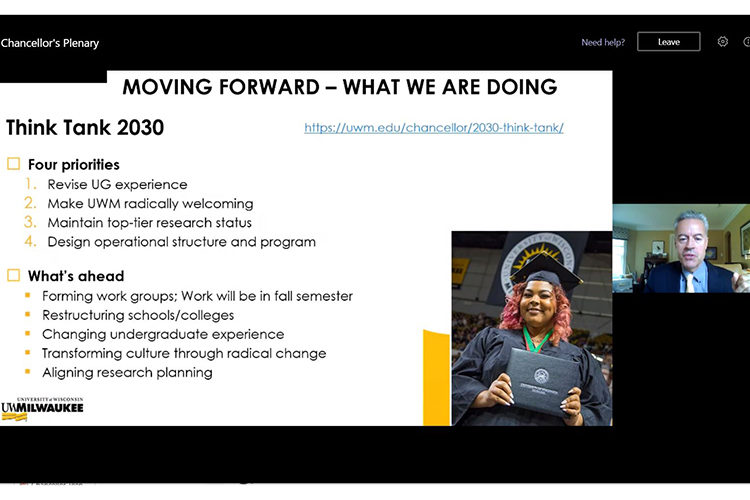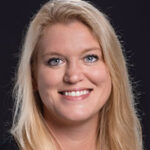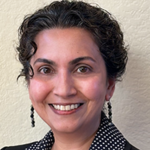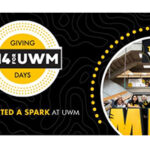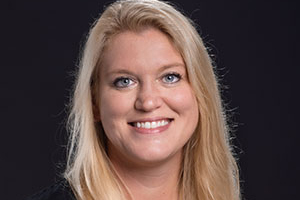That was then. This is now.
Chancellor Mark Mone opened his plenary address on Wednesday with a slide from last year’s plenary, followed quickly by a view of the current, radically changed, situation facing the university as UWM heads into the 2020-2021 academic year.
At that time, UWM was celebrating the return of students to campus, the new Lubar Entrepreneurship Center and Welcome Center, a successful fundraising campaign that raised over $250 million and the approval of a budget funding important capital projects like a new chemistry building.
This year, the focus of the plenary was on a series of new challenges that started with the coronavirus pandemic. That pandemic has affected the budget, enrollment and the university experience for students, staff and faculty. The need for a renewed focus on racial and social justice is another actor that needs to be addressed this academic year.
Mone’s address laid out all the issues the university is facing, but also outlined the steps being taken to address each of them.
Teams manage pandemic challenges
The effort to manage the pandemic during the spring and make plans for a fall reopening involved more than 100 faculty and staff working together with 13 sub-groups as part of the Emergency Operations Center.
Key to the return to campus are efforts to support students through scholarships and emergency grants, Mone said. As part of that effort, this year’s Oct. 11 Panther Prowl — ‘Don’t Prowl So Close to Me’ virtual run/walk will support Chancellor’s Student Success Fund. Fundraising this year has resulted in a 50% increase in the number of student awards for the coming year, Mone said.
The challenge of safely reopening the campus while supporting student learning and building a “culture of safety” among students and faculty/staff is complex, Mone said. But he was pleased to report that 95% of returning students wanted to come back to campus. He encouraged everyone to check out the university’s reopening website to stay up to date on the latest information on testing, return to class and surveillance procedures. A COVID-19 dashboard will be there soon.
The campus faces serious budget issues, Mone said. For 2020, UWM had anticipated a deficit of $15 million to $18 million. Due to federal CARES Act funding and expense reductions, this was reduced to $7 million. However, the picture is serious for 2020-2021 fiscal year. UWM is anticipating $25 million to $54 million in revenue losses. An enrollment decline, though less than anticipated, will affect the bottom line, particularly from the expected loss in nonresident tuition revenue. The cost of getting buildings ready and personal protective equipment have added to the budget concerns, he said. At the same time, the university is managing a 7.5% state budget lapse. All in all, “that’s a heavy lift,” Mone said.
Possible increased state support
One potentially positive development is the possibility of increased support from the state after years of decline. Tommy Thompson, former governor and now president of the UW System, is “a passionate and fierce” advocate for additional funding and making a significant investment in the UW System. Thompson has advocated and the Board of Regents has approved a request for $95.7 million in additional state support and a $1.2 billion capital request.
However, efforts to reduce administrative costs will continue, along with furloughs, a freeze on hires and travel. In addition, deans have not been replaced as the university looks at reorganizing. Since payroll is a large part of the budget, the university is estimating that 20-25 layoffs may also be needed. The chancellor said employees and supervisors will be encouraged to use the priority referral program, which can offer other opportunities on campus to laid off employees.
Developing detailed actions for Think Tank 2030 will start this fall. Among the goals are revising the undergraduate experience and making UWM more “radically welcoming.” “As Provost (Johannes) Britz says, 2030 is now,” Mone said.
UWM will continue its focus on diversity, equity and inclusion during the coming year. The tragedy is now in our “own backyard” in Kenosha, the chancellor noted, “when a Black man was shot by police repeatedly in front of his children. We must speak out and demand police reform and accountability. We must show support for our nation’s men, women and children of color, we must have this violence stopped.” As members of the university, we must engage in education, civil discourse and actions needed to contribute to advancing a more just Wisconsin, Mone added.
Pledge to increase diversity
In addition to ongoing educational efforts, the chancellor announced that UWM is the first four-year public and largest institution in the region to sign the pledge for the MMAC Region of Choice Initiative pledge. That commits the university to increase the diversity of employees and leadership. The university will also focus on recruiting and accepting more students of color. The university is also committing to build on existing efforts like the McNair Scholars, the Hispanic Serving Initiative and other efforts to help students succeed on campus.
The chancellor also talked about UWM’s planned “Moon Shot for Equity,” which is a partnership with the Education Advisory Board, a group the university has worked with for years. “The focus and the goal is to eliminate — I didn’t say reduce, I didn’t say make a few percentage point dent – I said eliminate achievement gaps,” Mone said.
Another effort underway is a third history book of the university, with Chia Vang, associate vice chancellor and professor of history, and David Pate, chair and associate professor of social work, as co-editors, to look at UWM’s contributions in supporting diversity in the area.
You can view the plenary on Microsoft Teams or on YouTube.
